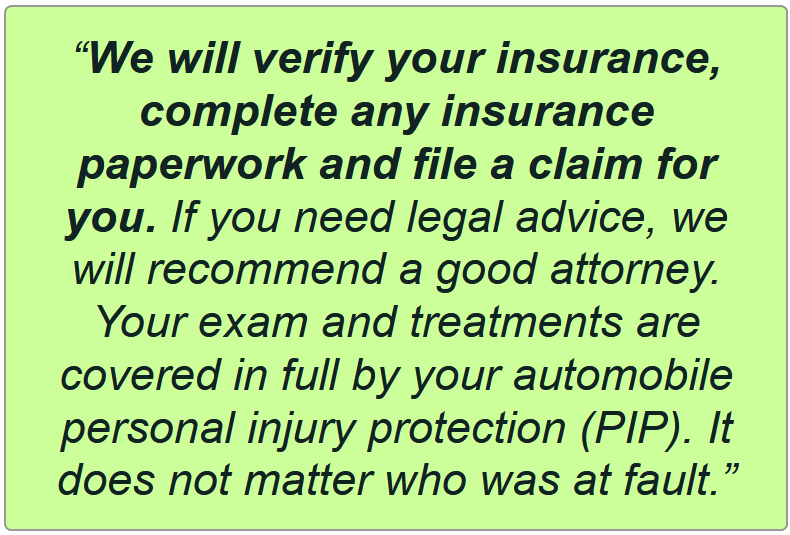#1 - Fakers, Frauds, and Phonies
Myth: People who claim they are injured from a car accident are con artists, looking to make a quick buck.
The vast majority of people who claim they have been injured in an auto accident HAVE ACTUALLY BEEN INJURED!! Insurance companies have made extensive efforts to suggest, imply, and sometimes actually state that most people who claim an auto accident injury is a fraud. Hollywood hasn’t helped either, as we’ve all seen movies in which someone is wearing a neck brace and faking an injury.
The fact that you have injuries and feel pain is not abnormal and is not suspicious. When two vehicles collide, it involves thousands of pounds of steel colliding together at high speeds and you are caught in the middle. It isn’t any wonder that you have been injured as a result.
#2 - Attorneys = Ambulance Chasers
Myth: Attorneys who deal with car and auto accidents are ambulance chaser, who work with fraudulent clients to abuse the system.
There are unscrupulous people in every profession, but the majority of attorneys care about their clients and act in their best interest. If you are feeling uncertain or uneasy about your current attorney, never hesitate to look for another or ask us for a referral.
#3 - Go to the Chiropractor to make a quick buck
Myth: If you have been in an accident, go to the chiropractor because he/she can make you money off your insurance claim. Imagine you were involved in a car accident where your head hit the steering wheel and three of your teeth were broken. A Dentist would be the “go-to” doctor in this scenario. After seeing your Dentist and having your teeth fixed, it would be common for the insurance company to offer a settlement to you as a means to reimbursing your dental expenses. This is no different than seeing a chiropractor for your neck or back pain in which the connective tissue (ligaments, tendons, fascia, cartilage etc) have been fissured, torn or broken.
The only reason this myth exists is because of the types of injuries Doctors of Chiropractic treat. DCs specialize in treating injuries to joints, ligaments, muscles, and nerves (called musculoskeletal & neurological injuries). These are the tissues most frequently injured in car accidents.
Chiropractors are the health care provider best suited to handle your injury as these are the types of injuries we are trained to treat. Many Doctors of Chiropractic have additional training and education in dealing with patients involved in motor vehicle accidents.
#4 - Injuries should heal within 6 to 12 weeks
Myth: Car accident injuries only involve sprain/strain type injuries and should resolve within 6-12 weeks on their own. This is one of those statements that insurance adjusters love to make, despite the fact that they have absolutely no training or expertise on medical matters. And the public not only believes this, they often tell friends, family members, and coworkers, which perpetuates the myth.
There are very clear facts that point to the exact opposite, that injuries of this nature commonly linger for some time and often never fully subside. According to Watkinson and Gargan (1), after an average period of 10.8 years, 86% of patients who had suffered a motor vehicle related injury experienced ongoing, related residual pain on a long-term basis with 68% eventually displaying degenerative changes on x-ray imaging. This finding is further supported byHildingsson andToolanen (2), who found that 43% of patients experiencing a neck injury related to a motor vehicle accident had discomfort sufficient to interfere with their capacity for work at 2 years follow-up.
Watkinson A,Gargan MF,Bannister GC. Prognostic factors in soft tissue injuries of the cervical spine. Injury. 1991 Jul;22(4):307-9.
Hildingsson C,Toolanen G. Outcome after soft-tissue injury of the cervical spine. A prospective study of 93 car-accident victims. Acta Orthop Scand. 1990 Aug;61(4):357-9.
#5 - If there isn’t significant damage to the vehicle, then you can’t be seriously injured.
Myth: Car accident injuries work in proportion to the amount of damage to a car, meaning that if only minor damage was done, you cannot be seriously injured (...and are therefore faking your injuries to make money...)
This is simply not true. In fact, studies were performed nearly 40 years ago proving quite the opposite. According to Martinez (1), an eight mile per hour rear end collision produces twice the normal force of gravity (2g) in acceleration of the vehicle. The occupants head will actually experience 5g of acceleration. AT 8 MILES AN HOUR! MnNab (2) further showed that a 15 mph collision will accelerate the vehicle to 10g and the occupants head (an neck) to 20-25g. Additional research has been performed since this time and still no direct correlation as ever been found linking degree of car damage to severity of injury (3).
This is NOT to contradict other information on our website in reference to gaining legal representation (link to segment). That information discusses the “real-world” fact that attorneys will often hesitate to take on a case when damage estimates are below $1500. This is because the attorney knows that very little money will be forthcoming and therefore it is often not worth his/her time to make the effort.
(1) Martinez, J.; Garcia, D. “A Model for Whiplash.” J. Biomech. 1968; 1:23.
(2) McNab, I. “Acceleration Extension Injuries of the Cervical Spine.” The Spine, vol. II. Rothman, Richard, and Simeone 1975.
(3) Freeman MD, Croft AC, Rossignol AM, Weaver DS, Reiser M. A review and methodologic critique of the literature refuting whiplash syndrome. Spine (Phila Pa 1976). 1999 Jan 1;24(1):86-96
#6 If you don’t feel pain right away, you haven’t been injured that badly.
Myth: If you don’t feel pain within the first 72 hours after accident, you aren’t really injured.
Most people do feel pain from a car accident within the first 72 hours, but this is not always the case. Sometimes it will take 1-2 weeks before you start feeling all of your symptoms.
Why is this? First of all, inflammation has a tendency to build up over time and this process can be flow and gradual at times. In addition, many people “take it easy” for the first week after an accident. If their neck hurts when they turn to the left, the simply stop turning to the left. Then a week or two later, when they decide to return to their normal life, they suddenly realize that they have a great deal of pain with relatively normal activities. The injury was there all along...you just didn’t know it.
Another factor is the “pain gating” principle. Simply stated, this means that your body mainly detects or feels the most painful injury, which will act to mask or cover up other injuries. Once the most severe of your injuries and pain have calmed down, you may start to notice additional areas of injury. These injuries have been there all along, you just didn't notice them.


